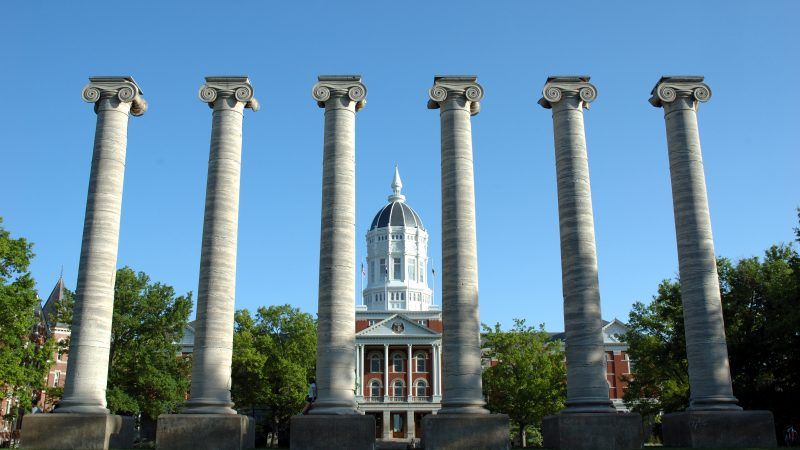Mizzou Received $5 Million to Hire Austrian Economists. A Lawsuit Claims It Misspent the Money.
Terms of the grant specified that if Missouri did not use the money to hire free market professors, the donation would revert to Hillsdale.

Sherlock Hibbs, a wealthy Wall Street financier with ties to the University of Missouri, died in 2002. A fan of free market economics, the Austrian School, and Ludwig von Mises in particular, Hibbs specified in his will that $5 million would go to the university for the purposes of hiring "dedicated and articulate disciples" of this philosophy.
There was an interesting catch. If Mizzou failed to use the money to fund acolytes of Mises, the donation would instead go to Hillsdale College, a conservative institution in Michigan. Hibbs seemingly did not trust Mizzou to fulfill his terms and thus structured the gift so that an ideologically sympathetic college would have an incentive to hold the Mizzou accountable.
Hibbs was apparently right to worry. Hillsdale is now suing Mizzou, and alleges that the university willfully misspent the funds on faculty members who have nothing to do with either von Mises or Austrian economics.
"MU has never appointed a dedicated and articulate disciple of the Ludwig von Mises (Austrian) School of Economics to a Chair or Distinguished Professorship funded by Mr. Hibbs' gift," wrote Hillsdale's attorneys in the lawsuit. "Instead, MU provided millions of dollars over 15 years to individuals who were not Austrian economists."
Ironically, Hillsdale is being represented in this lawsuit by Jay Nixon, a former Democratic governor of Missouri. Four of the current curators of Mizzou's governing board were previously appointed by Nixon.
The professors currently funded by Hibbs' donation are Dan Turban, Karen Schnatterly, Rhonda Reger and Lisa Scheer, according to The Columbia Daily Tribune. In 2018, each of them signed a statement attesting that "consistent with the stipulation in the will of Mr. Hibbs, each of us believes we are 'a dedicated and articulate disciple of the free and open market economy (the Ludwig von Mises Austrian School of Economics).'"
But Phil Magness, an economic historian and senior research fellow at the American Institute for Economic Research, disputes that any of the above individuals are followers of von Mises.
"None of the named faculty appear to have any meaningful research in or connection to Austrian economics," Magness tells Reason. "It looks like Missouri accepted the cash, then failed to honor the terms of the donor."
I reached out to Turban, Schnatterly, Reger, and Scheer for comment, asking whether they could point me to any research they have done or coursework they've assigned, that references von Mises. Only Schnatterly responded: She directed me to speak with Mizzou's director of media relations, Christian Basi, instead.
In an email, Basi said my line of inquiry was not warranted.
"I've been forwarded a couple of your requests to the professors asking about classes they taught or studies they've completed," he said. "The gift agreement does not place any restrictions on the curriculum nor the research work of professors holding those appointments. It only asks about their belief in that particular economic model."
I replied that if these academics were indeed "dedicated disciples" of von Mises and Austrian economics, then I would expect it to be evident in their work or at least hinted at.
"I understand that perspective, but it is not a requirement of the gift," said Basi.
That strikes me as splitting hairs. Quite literally, the requirement was that Mizzou spend the money on "dedicated disciples" of von Mises and the Austrian school. The individuals who benefited from the gift do not appear to fit that definition at all, regardless of what they claimed in their signed statement.
We will see how the legal battle unfolds, but the just outcome would be Mizzou writing Hillsdale a check for $5 million.


Show Comments (73)